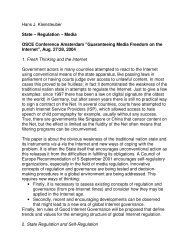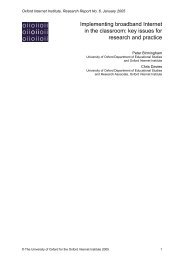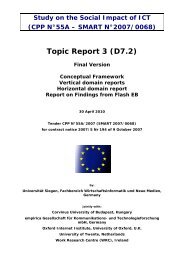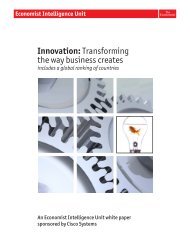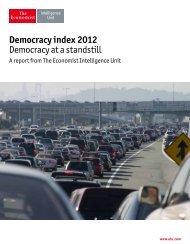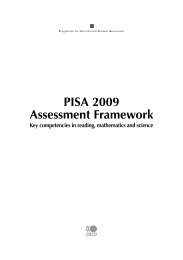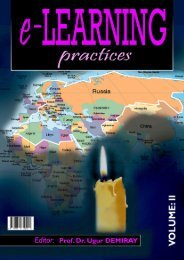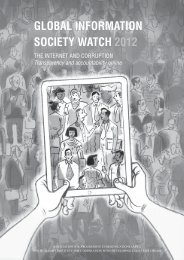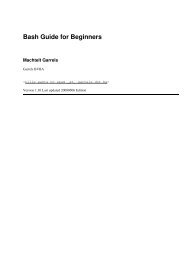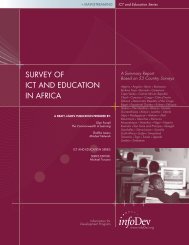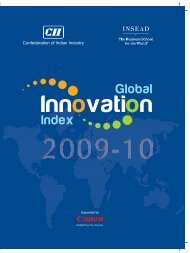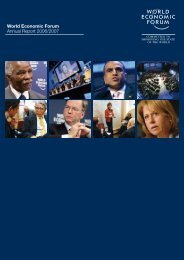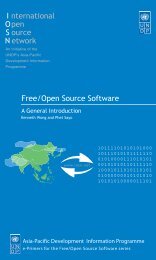You also want an ePaper? Increase the reach of your titles
YUMPU automatically turns print PDFs into web optimized ePapers that Google loves.
FOREWORDFree software means software that respects the user’s <strong>free</strong>dom. It means that users are <strong>free</strong> to run theprograms as they wish, <strong>free</strong> to study and change the software (or hire others to do it for them), <strong>free</strong> toredistribute copies to others, and <strong>free</strong> to publish modified versions. As a consequence, users are <strong>free</strong> toshare, and form communities to exercise effective control over the software they use. Free software mayalso be gratis, zero price, but this is not always the case.Some users refer to this as open source. That term focuses on the technical benefits that result whensoftware can be reviewed by large numbers of developers and users, the business advantages of usingit, and the business models that support its development and use. The term <strong>free</strong> software refers to thesocial and ethical importance of <strong>free</strong>dom, as well as to the practical benefits it brings.The social and practical imperatives for sharing and changing useful works such as software create arevolution in what it means to publish. The technology of the printing press taught readers to think ofwritten works as fixed – written once, for readers to use passively thereafter. This technology did notmake it easy for readers, who generally did not have presses of their own, to adapt, improve, and sharecopies of books, and they became accustomed to these limitations. So when citizens in large numbersbegan to use personal computers, many did not question the legal and business systems that placedsimilar limitations on using software. But this time, the limitation was not a natural consequence of thetechnology. It was imposed by software developers, who found it profitable to keep users under theircontrol. The developers forbid users to share the software, and by denying users the source code, preventthem from changing it.Today, however, there is an alternative: <strong>free</strong> software, the product of a community built by a millionwilling developers – some volunteers, some paid to contribute. Free software allows users to take fulladvantage of what their computers can do. It is our door to escape from the limitations of the printingpress, into a world where useful works, such as software, are developed among the users, by the users,for the users.Where software is not made artificially scarce by misguided incentive systems that encouragedevelopment of software by locking up its users.Where the users can collaborate as they see fit in making the software do what they want it to do. Wherethe users of software are <strong>free</strong> to run it, share it, and adapt it together or individually. This is the world ofFree and Open Source Software (FOSS).Non-<strong>free</strong> software keeps users divided and helpless. When a nation increases the use of non-<strong>free</strong> software,it is not development, it is permanent dependency. Only the use of FOSS permits sustainable development– it is technology that local people are <strong>free</strong> to learn about, maintain, adapt, and reapply.How can governments move their countries towards FOSS? In two ways. First, switching to Free Softwarein schools will teach children the spirit of community cooperation, while producing graduates that areskilled in using and maintaining Free Software. Second, mandating migration to Free Software ingovernment agencies will create demand for these graduates’ skills, and build a local economy of FreeSoftware support.The International Open Source Network (IOSN) is an initiative of UNDP’s Asia-Pacific DevelopmentInformation Programme, and operates under the principle of “Software Freedom for All” (SFA). Its workincludes provision of support and assistance, a centre of excellence, and an information clearing-housefor Free and Open Source Software in the Asia-Pacific region.Through the IOSN/SFA initiative, UNDP provides policy support and advisory services to governmentbodies, non-profit organizations, donor agencies and others. It publishes practical tools and materials,v



